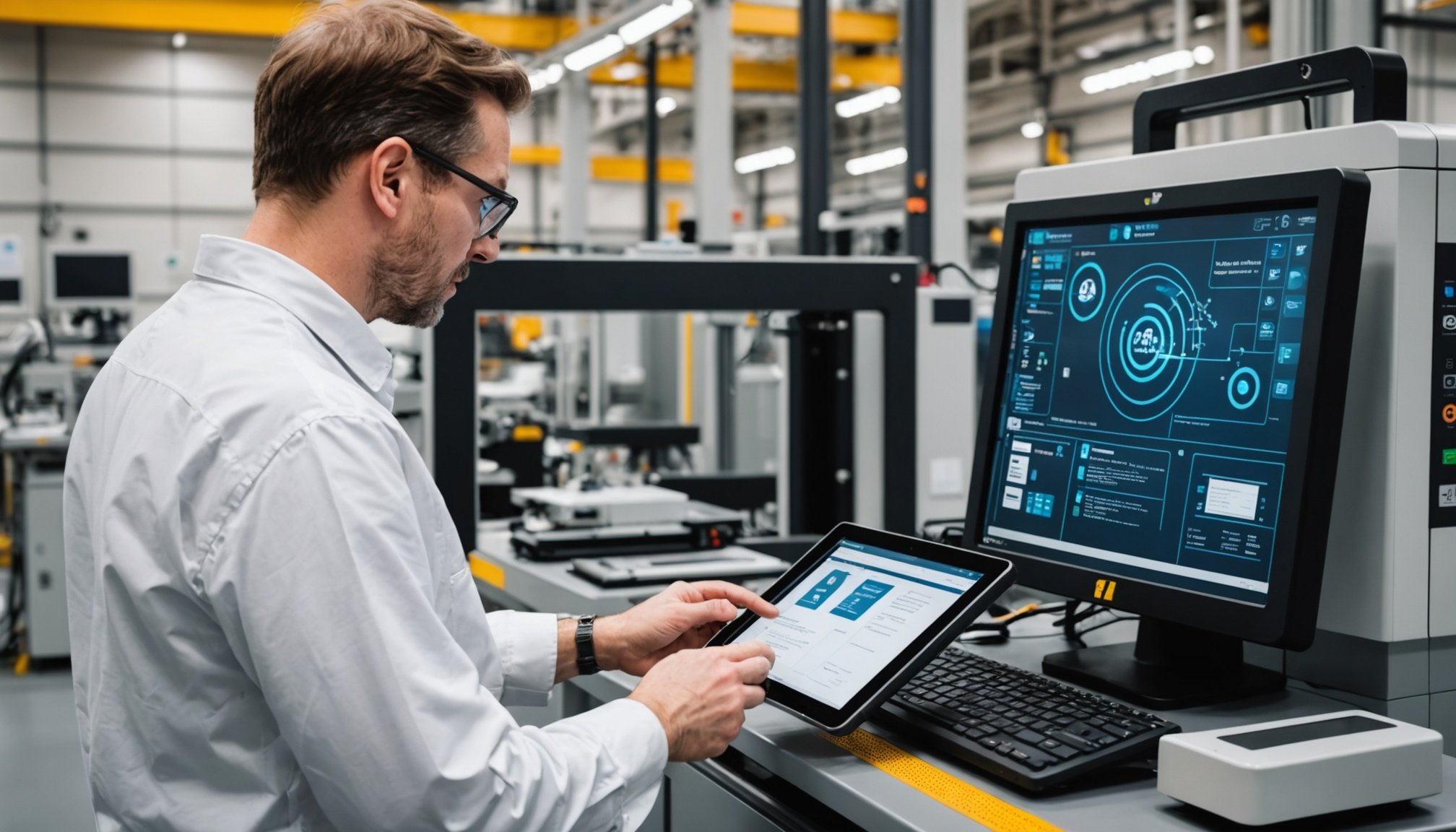Overview of Smart Factory Technologies
Smart Factory Technologies are revolutionising modern manufacturing by integrating internet-enabled systems to enhance efficiency and productivity. These advanced technologies, often associated with Industry 4.0, include the Internet of Things (IoT), Artificial Intelligence (AI), automation, and data analytics. IoT allows machines and equipment to communicate in real-time, reducing downtime and optimising resource allocation. AI enhances decision-making through pattern recognition and predictive analysis, allowing for quicker and more precise problem-solving.
Automation simplifies complex processes, minimising human error and increasing production speed. Data analytics provide insights into operations, driving informed decisions and strategic planning. The benefits of embracing smart factories lie in their ability to boost productivity and enhance competitiveness. By implementing these innovations, manufacturers can expect:
Also read : Transforming financial security: how blockchain is reshaping transactions in the uk
- Increased operational efficiency with real-time data
- Greater agility and responsiveness to market changes
- Reduced waste and resource consumption.
Manufacturing Innovation through Smart Factory Technologies is not just about maintaining competitive edges but also fostering a culture of continuous improvement. Companies adopting these technologies position themselves as leaders in innovation, securing a robust future in the ever-evolving industrial landscape.
Current Trends in UK Manufacturing
The landscape of UK manufacturing is rapidly evolving with key trends setting the stage for future innovations. Industry insights reveal a growing emphasis on sustainability and the circular economy. These trends are pivotal as manufacturers transition towards more environmentally friendly and economically beneficial practices. Implementing sustainable methods not only reduces the environmental impact but also ensures resource efficiency, aligning with global standards.
Have you seen this : Transforming UK Manufacturing: Cutting-Edge 3D Printing Techniques Driving Innovation
Government initiatives play a significant role in supporting technology adoption within the sector. Various policies have been introduced to facilitate the integration of smart solutions, inevitably enhancing competitiveness in global markets. With incentives for cutting-edge technology investments and tax reforms, the UK government aims to propel manufacturers towards a future-ready approach.
Such structured support fosters a stable environment for adopting industry 4.0 tools, thereby enhancing manufacturing innovation. These initiatives also encourage collaborations between public sectors and businesses, providing the necessary infrastructure and resources for technological upgrades.
The fusion of sustainability with technological advancement not only redefines efficiency but also prepares UK manufacturers for impending global challenges, setting a blueprint for others to follow.
Case Studies of Successful UK Manufacturers
Exploring cases of UK manufacturers adopting smart technologies offers valuable insights into the transformative power of Industry 4.0. In this section, we’ll delve into three compelling examples of success within the industry.
Manufacturer A: Implementing IoT Solutions
Manufacturer A leveraged IoT to streamline their operations. By integrating IoT-enabled devices, they achieved real-time monitoring of machinery, significantly reducing downtime. This transition addressed challenges such as inefficient resource allocation and inadequate maintenance planning. With IoT, they not only boosted operational efficiency but also improved productivity metrics by 15%.
Manufacturer B: AI-Powered Production
In the heart of AI-powered production, Manufacturer B adopted artificial intelligence for predictive analysis, resulting in enhanced decision-making abilities. They tackled issues like unexpected equipment failures by implementing AI algorithms that forecasted maintenance needs. This implementation improved overall equipment efficiency by 20%, demonstrating the potential of AI in manufacturing innovation.
Manufacturer C: Automation in Practice
Manufacturer C embraced automation to revolutionise their assembly line. By automating repetitive tasks, they minimised human error and increased production speed by 25%. Overcoming initial resistance, they provided stakeholders training, showcasing the positive impacts of seamless automation. This case highlights the benefits of embracing smart factories in modern manufacturing.
Actionable Strategies for Implementation
Successfully adopting Smart Factory Technologies involves a strategic approach tailored to your organisation’s unique needs. Begin by assessing current manufacturing capabilities to understand existing strengths and uncover areas for improvement. This evaluation forms the foundation for smart factory adoption, enabling a focused strategy aligned with business goals.
In selecting technologies, consider the specific challenges your organisation faces. For instance, IoT might enhance machine connectivity, while AI could boost predictive maintenance capabilities. It’s crucial to prioritise technologies that address your most pressing needs, ensuring immediate impact and long-term sustainability.
Building a culture of innovation and continuous improvement is essential. Encourage team involvement in ideation sessions and foster a mindset that welcomes change. Training programs can bridge skills gaps, equipping employees to leverage new technologies effectively. This approach not only facilitates smoother transitions but also enhances team engagement and ownership.
Change management is integral to this process. Transparent communication and strong leadership support can mitigate resistance and ensure all stakeholders are aligned with the transformation journey. Emphasising the benefits, such as increased productivity and competitiveness, bolsters employee buy-in and hastens adoption.
Overcoming Obstacles and Challenges
Manufacturing Challenges often impede the adoption of smart factory technologies, presenting hurdles like outdated infrastructure and resistance to change. Addressing these requires identifying common barriers to adoption, such as significant initial investments and the complexity of technology integration. Companies frequently face a skills gap, where existing workforces may lack the necessary technical expertise.
To counter this, comprehensive workforce training is critical. Implementing robust training programs that focus on upskilling employees ensures a smooth transition and efficient technology use. It empowers personnel to maximise the potential of new systems, boosting confidence and productivity.
Leadership support is paramount in overcoming resistance. It involves fostering a culture of stakeholder engagement, where management leads by example, underscoring the long-term benefits of manufacturing innovation. Transparent communication about the strategic objectives and advantages of these technologies can help build trust and align everyone with the change initiatives.
Strategic solutions could include phased rollouts and pilot projects, allowing teams to adapt gradually. By actively involving all levels of an organisation and remaining solution-oriented, companies can effectively navigate challenges and streamline their transformation into smart factories.
Expert Opinions and Industry Insights
Gaining insights from industry experts and thought leaders can illuminate future trends and their implications. Experts widely agree that smart factory technologies like IoT, AI, automation, and data analytics are pivotal in redefining manufacturing. Listening to experts such as Jane Collins, a leading figure in manufacturing innovation, provides a deeper understanding. She states that embracing these technologies not only drives productivity but also bolsters global competitiveness, ensuring a robust economic impact.
Renowned experts highlight that the most significant long-term impact of smart factories is their potential to revolutionise the UK economy. By increasing operational efficiency and reducing waste, manufacturers can secure a stronger financial standing. Experts like Dr. Michael Foster, who specialise in Industry 4.0, stress the importance of gradual technological adoption tailored to specific industry needs.
Recommendations from industry specialists also advise manufacturers to focus on continuous innovation and adaptation. By fostering an environment of thought leadership and collaboration, UK manufacturers can remain agile and resilient amidst ever-evolving market demands. Engaging with these expert insights equips manufacturers with strategic advantage in navigating the complexities of smart technology integration.
Future-Proofing Your Manufacturing Strategy
In the evolving world of Industry 4.0, developing a future-proof manufacturing strategy is crucial for long-term success. Strategic foresight involves understanding the potential impacts of smart factory technologies and anticipating changes within the industry. By planning ahead, manufacturers can identify opportunities and risks, enabling them to stay competitive amid technological advancements.
Crafting an innovation roadmap is essential for guiding the adoption of smart technologies. This should encompass a clear timeline and milestones, allowing for gradual implementation while managing resources efficiently. Prioritising foundational technologies such as IoT, AI, and automation ensures a solid base from which manufacturers can expand their capabilities.
To maintain agility, monitoring progress is vital. Regularly evaluating performance metrics and adapting strategies allow businesses to respond swiftly to market demands. This proactive approach helps in overcoming unforeseen challenges and capitalising on emerging opportunities.
Adopting best practices requires fostering a culture of continuous learning and adaptation. Encouraging collaboration between teams and leveraging expert insights equips manufacturers with invaluable knowledge. By integrating these practices, organisations can create a robust framework that supports sustainable growth, inspiring confidence in navigating the complexities of modern manufacturing.











